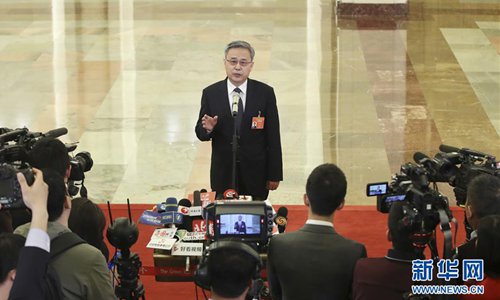Accusations that China implements state monopoly capitalism is 'huge misunderstanding': Regulator

Guo Shuping, chairman of the China Banking and Insurance Regulatory Commission (CBIRC). Photo: Xinhua
Accusations of China implementing state-monopoly capitalism are a huge misunderstanding, Guo Shuqing, chairman of the China Banking and Insurance Regulatory Commission (CBIRC), said on Monday.
Over the past decade, China's actual contribution to global growth averaged about 30 percent, but surprisingly, there are still some negative opinions.
There was an argument more than 20 years ago that the Chinese economy was not market-based and needed a transition period. The accusations of state-monopoly capitalism in recent years were built on the assumption that China has a strong state-owned economic sector, with state industrial policies distorting market relationships, which is a huge misunderstanding, Guo said in a speech to the 14th Asian Financial Forum.
Guo made a five-point argument against the accusations, according to a speech transcript posted on the commission's website.
First, China's private economy accounts for 60 percent of the entire economy, and the country had virtually no non-public economy at the end of the 1970s, when reforms were kick-started. This would not have happened if the country had adopted state-monopolies and national protection.
Second, China's industrial policies have largely been in line with market-oriented reforms. At the end of the 1970s, the country encouraged the development of light industry while swiftly opening up imports of consumption items ranging from TVs and washing machines to cars and trucks.
Beginning in the late 1980s, the country aimed its industrial policies at preventing repetitive construction arising from excessive competition. Over the past 10 years, many companies that were heavy energy users, highly polluting and highly indebted have been eliminated, Guo explained in his speech, noting it is open, fair and sufficient competition that makes China the country with the most complete industrial categories.
Third, what state-owned enterprises (SOEs) have received from the government are negative subsidies on the whole. SOEs' tax burdens are on average about double those of privately run businesses, and they have actually broader social responsibilities, factoring in relevant budgets arranged by governments at various levels for the distribution and relocation of redundant employees, grants for employees' social security, and public services spending.
Fourth, the financial affairs of banks and SOEs are entirely independent and even the banks with big state shareholdings are unlikely to transfer interests to SOEs.
Fifth, the competitiveness of Chinese products is not due to impaired labor rights, according to Guo, and over the past decade, Chinese workers have seen rapid growth in their incomes, with migrant workers nearly doubling their income levels.
The CBIRC chairman vowed to resolutely oppose monopolies and unfair competition, and he stressed that the basis for financial innovation must be under prudent regulatory oversight.
The country will prevent and defuse all types of risks, put firmly in place a national security curtain, and safeguard law and order, as well as the dignity of sovereignty, he said.
Global Times
